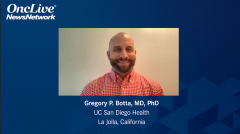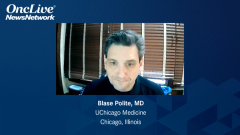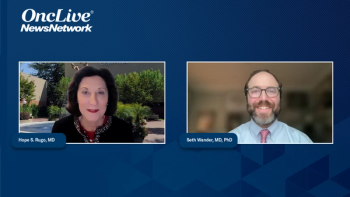
Objectives of the CIRCULATE-US Study in Colorectal Cancer
An overview of the design of the CIRCULATE-US study, set to further explore the potential of ctDNA testing in colorectal cancer.
Episodes in this series

Blase Polite, MD: CIRCULATE-Japan and CIRCULATE-US have the same name because it is part of the IDEA collaboration, which was the worldwide successful endeavor to look at 3 vs 6 months of chemotherapy in patients with stage III colon cancer. That has changed the standard of care for many of our patients moving to 3 months of therapy. This is a coordinated effort and asks the questions, “Do we need to treat patients who are ctDNA [circulating tumor DNA] negative with chemotherapy? Can we escalate therapy for patients who are ctDNA positive?” The VEGA study looks at whether we can de-escalate, and CIRCULATE-US has a similar arm. If you look at VEGA vs CIRCULATE-US, the CIRCULATE-US study looks at patients with low-risk stage III cancer—stage IIIA and IIIB. If they’re ctDNA negative after therapy, they’re randomized to CAPOX [capecitabine, oxaliplatin] or FOLFOX [5-fluorouracil, leucovorin, oxaliplatin]; the other arm is surveillance. Essentially, it’s 3 months of chemotherapy with CAPOX [capecitabine, oxaliplatin] or 6 months with FOLFOX, or observation. It looks at disease-free survival as a primary end point.
Cohort A is what I just described. The second part of that study is called cohort B, which is like the ALTAIR study in CIRCULATE-Japan. It looks at patients with stage II or IIIC cancer who are ctDNA positive; that’s the first group. The other group is patients who are in the surveillance arm of cohort A who turn ctDNA positive; that’s cohort B. It’s either de novo stage IIIC and II colon cancer that’s ctDNA positive postoperatively or stage IIIA and IIIB randomized to the surveillance arm in cohort A who subsequently become positive. Patients in cohort B will be randomized to 6 months of CAPOX [capecitabine, oxaliplatin], FOLFOX [5-fluorouracil, leucovorin, oxaliplatin], or an escalation arm of FOLFOXIRI [5-fluorouracil, leucovorin, oxaliplatin, irinotecan]. The United States is looking at a much more aggressive approach than CIRCULATE-Japan in terms of our escalation. They’re using Lonsurf [trifluridine, tipiracil]. We’re inquiring about incorporating irinotecan in this high-risk population and if that will provide us a disease-free survival advantage. These are the kind of studies we need to be doing. CIRCULATE-US should be opening in early 2022, it’s sponsored by NRG and SWOG, so it should be available to many centers around the country. This is probably 1 of the most important trials we’ve done in adjuvant colon cancer in a while because it can change the standard of care. If both trials’ hypotheses are proven, then we’ll change the standard of care. We’ll stop giving chemotherapy to a large percentage of stage IIIA and IIIB patients. We may be able to find a way to rescue patients who are ctDNA positive with a more aggressive chemotherapy backbone.
Transcript edited for clarity.




































